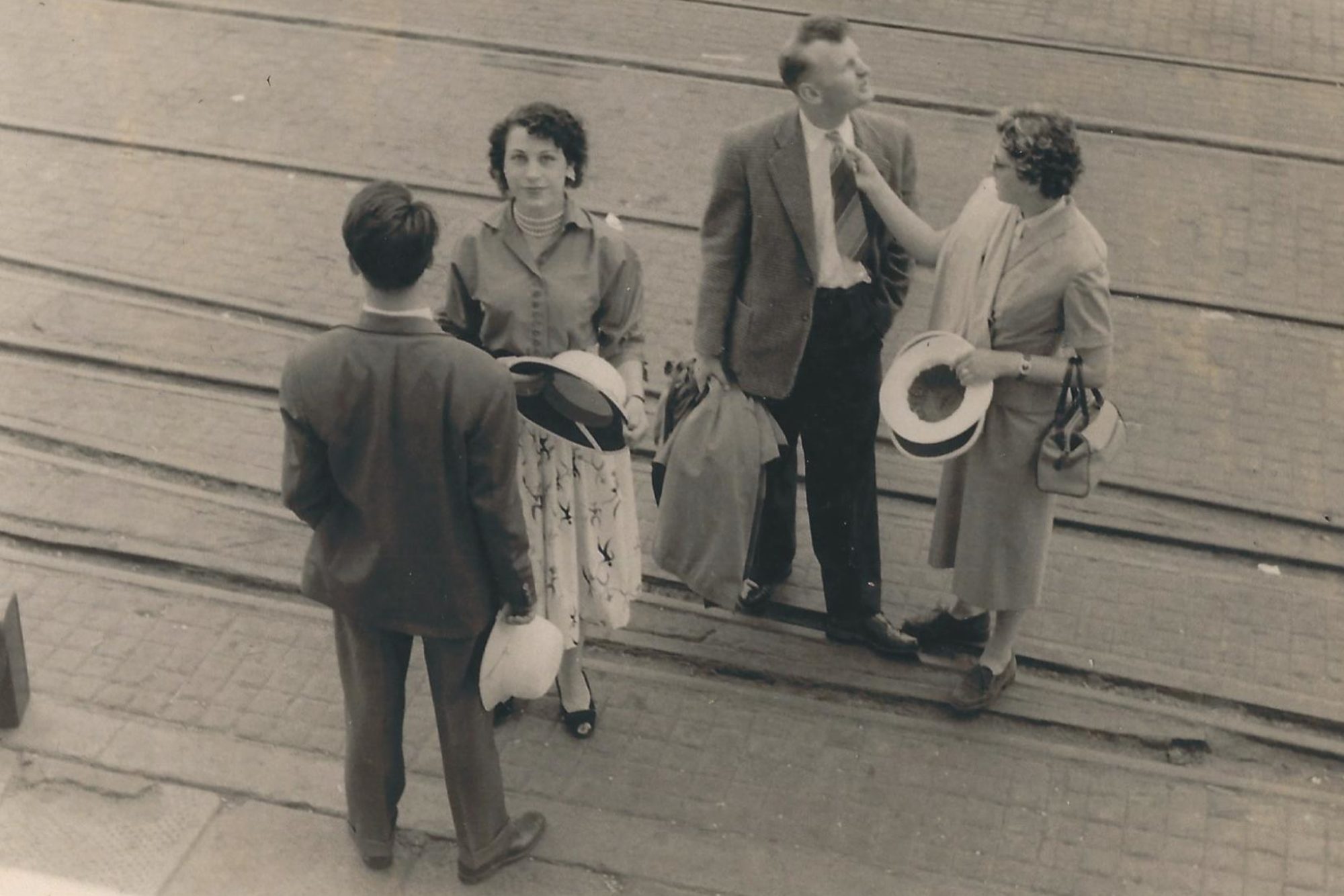‘Migrating dialogues’ is a transit zone. Between here and there. Between the past and the present. Between the personal and the geopolitical. Between ourselves and others. It is a collection of stories on migration. How does a transplantation process effect your own life and the lives of those close to you? Which choices did you make yourself and which were made for you? What are HERE and THERE in the first place? Where do the self-justifications and blind spots reside? What is left unsaid?
We are mapping our own migration routes by interviewing family and friends. Looking into our own migration histories, facing our own doubts, failures and vulnerabilities, opens up the possibility of a dialogue with others about their experiences. Confronting our own stories we invite others to share theirs. This ongoing investigation and (re-) collection is developed and documented in performances, audiovisual installations and podcasts. It is an attempt to engage with different perspectives on migration. Migration is a complex story of all times, of all places, that connects all of us.
Check out the pictures of the audiovisual installation that keeps growing with every new story.
Vrijstaat O Ostend – CC Berchem – Arenberg Antwerp – Rataplan Antwerp – Podcast Festival @ NEST Ghent – Bomfestival Bij de Vieze Gasten – Loket Nest – Cohousing De schilders – Nest – Victoria Deluxe Ghent…
Migrating Dialogues #5 Erf

drawing by Christine Roggeman
5 february ’22 – Chambres d’O – 19.30 & 21.30u
Huiskamerfestival Oostende
ALTERNATIVE SHOWING – studio les ballets c de la B – Nieuwevaart 118 – 17h & 20h
Erf is a performance about the intertwinement between the intimate and the political, between the colonisation of cells and continents. From one grandmother she inherits ivory warriors from Congo, from the other a genetic fault. The granddaughter fights her way through colonial family archives and through the sterile corridors of embryo-selection .
A dialogue of the deaf unfolds between grandmother and granddaughter. They stumble over themselves and each other and over remnants of memories.
Which anecdotes are told over and over again at family parties and what sticks behind the wallpaper?
Credits
Text and direction: Helena Elshout
Performance: Laura Vroom
In collaboration with Rona Kennedy & Fabián Espinosa Díaz
Thanks to les ballets C de la B, Chambres d’O, Mestizo Arts Platform en de wipcoop-feedbackgroep, Campo, Manoeuvre, Jacquie Bapura, Arnout De Cleene, Marthe Vroest, Laura Caroen, Sofie Verhoeven, Sofie Verraest, Rachid Laachir, Faja Lobi
Migrating Dialogues #4 Bamama
Bamama. Mother in plural. What do you inherit from your mothers and what do you pass on to your children? Bamama is a personal investigation into motherhood as heritage. Of land and goods. Of movable and immovable. Of pain. Privileges. Big feet. Cut off breasts. Bad genes. With money, freezers and white coats genetic flaws are being hoaxed. A pattern redrawn. But what about the other inheritances? How can I map, select, test and transform those? The myths. The taboos. The blind spots. A bulging scrapbook reshuffles crumbling memories. How can I write a new story with inherited words?
Credits
Performance: Helena Elshout
Concept and text: Helena Elshout, based on interviews with Mieke Elshout
Concept and audio assistance: Fabián Espinosa-Díaz
Concept and dramaturgy: Rona Kennedy
Concept, video and montage: Arnout De Cleene
Thanks to MAP, ONBETAALBAAR, CAMPO, Faja Lobi
Check out the pictures of WIPCOOP @ Campo Ghent
Migrating Dialogues #3 Ladies’ Choice
I am talking to my mother about drawing lines in the sand. We dance, sing and ask questions to the sea. Why do you need to shake your shoes? We learn new languages, unpack boxes, dig up memories and blind spots. How do we map our migrations, define our boundaries? Maybe we are not always kind, but learning to put our foot down is courage enough.
Check out the pictures of wipcoop sessions @Rataplan Antwerp
& UNSETTLED by KAAP @Raversijde
Check out the pictures of wipcoop sessions @Rataplan Antwerpen & UNSETTLED by KAAP @Raversijde
Credits
Performance: Rona Kennedy
Concept and text: Rona Kennedy, based on interviews with Audrey Kennedy (#3)
Concept, sound design, editing: Fabián Espinosa-Díaz
Concept and dramaturgy: Helena Elshout
Migrating Dialogues #2 Spaghetti Junction
Spaghetti Junction is about my time as a student in London and my arrival in Belgium. In the Queerkaffee in a squat in Ghent, I meet Lola, an elusive opera singer. Lola and I are two British women who somehow find ourselves in Belgium. Roughly the same age and social class, our lives are like Spaghetti Junction: crossing paths, intersecting and departing. We are both so called ‘expats’. But what does that actually mean?
In September 1998, Lola and I both leave the UK for Belgium. Why not, I can always go back if it doesn’t work out. I’ll see how it goes. On the 22nd of September 1998, Samira Adamu is murdered by the two policemen charged with her forced deportation. A third films everything.
Check out the pictures of wipcoop sessions @ Rataplan Antwerpen & @Victoria Deluxe Gent
Credits
Performance: Rona Kennedy
Concept and text: Rona Kennedy, based on interviews with Ademilola Oduwole (#2)
Concept, sound design, editing: Fabián Espinosa-Díaz
Concept and dramaturgy: Helena Elshout
Migrating Dialogues #1 Inheriting the Empire
In Inheriting the Empire I am having an ongoing a conversation with my dad about my childhood in South-Africa, the UK and Ohio. About apartheid, boarding schools and terrorism. About spiders, sick bags and hand grenades. About shame, anger and silence.
It is the 6 September 1970. My mum and dad are flying for the first time in their lives. It won’t be their last time.
Everything is new, exciting, strange. My dad is 22, my mum has just turned 23. They are newlyweds but this is not their honeymoon.
They are emigrating.
The 6th of September 1970 is ‘Skyjack Sunday’.
Check out the pictures @Arenberg Antwerp
Credits
Performance: Rona Kennedy
Concept and text: Rona Kennedy, based on interviews with William Kennedy (#1)
Concept, sound design, editing: Fabián Espinosa-Díaz
Concept and dramaturgy: Helena Elshout













































